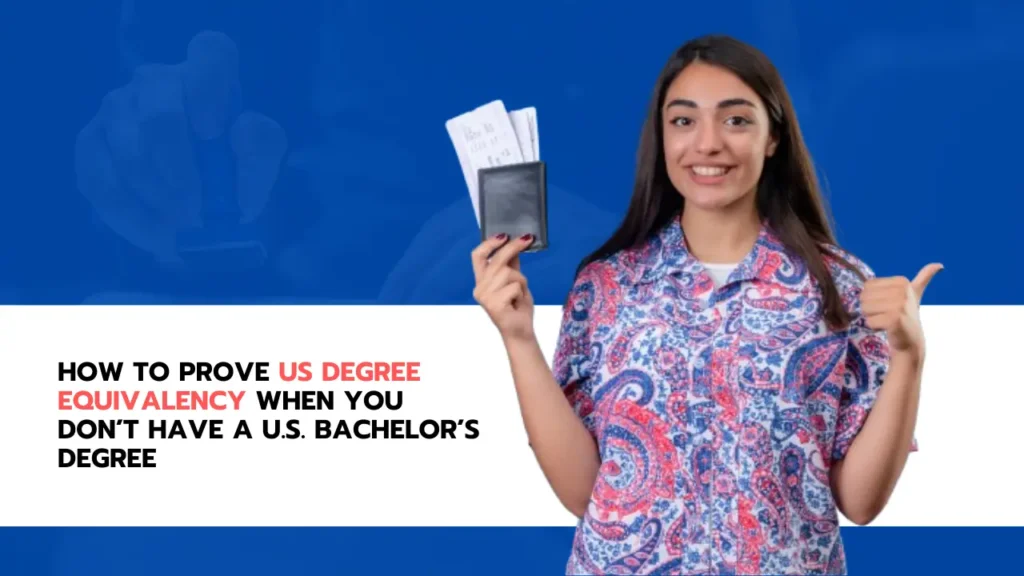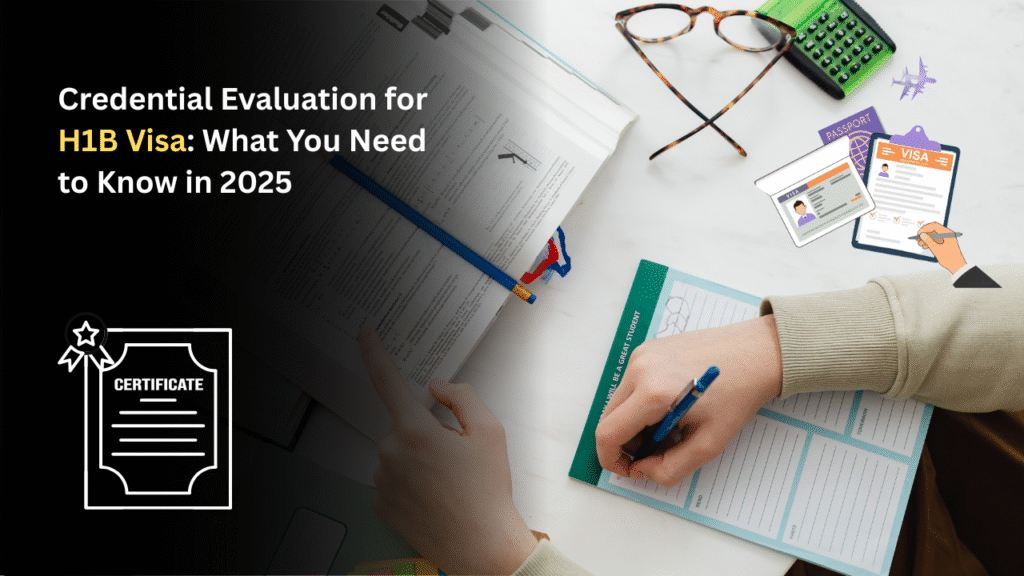How to Prove Equivalency When You Don’t Have a U.S. Bachelor’s Degree
You’re More Qualified Than You Think
Not everyone takes the traditional route through a four-year U.S. college program. Maybe you studied overseas, maybe you left school early to work, or maybe you built your skills through real-world experience rather than in a lecture hall.
If you’re now trying to land a job, apply for a visa, or get into graduate school in the U.S., you may run into this phrase: “U.S. bachelor’s degree or equivalent.”
It can sound intimidating—but here’s the good news: You can absolutely prove that your education, work experience, and professional background are equivalent to a U.S. bachelor’s degree. This article will walk you through how to do exactly that.
Why Equivalency Matters
Let’s say you’re applying for a job in the U.S., or an H-1B visa, or graduate school. Many of these paths require a U.S. bachelor’s degree. If you don’t have one, you’re not out of luck—you just have to demonstrate that your knowledge and experience equal or exceed what someone with that degree would have.
The keyword here is equivalency—and that doesn’t always mean traditional education. It could be a combination of work history, foreign schooling, certifications, and even professional references. The U.S. system makes room for those who’ve taken non-traditional paths—you just have to prove it.
How the U.S. Defines Degree Equivalency
In many formal processes—especially immigration-related ones like the H-1B visa—the U.S. uses something called the “Three-for-One Rule.” It’s a simple equation:
Three years of specialized, progressive work experience = One year of college education.
So, if a U.S. bachelor’s degree typically takes four years, you could substitute it with 12 years of relevant work experience, assuming it meets the criteria of being “progressive” and in the correct field.
But that’s just one route. You can also combine:
- Partial or full foreign education
- Professional training
- Recognized certifications
- Letters from experts in your field
Let’s explore how to make all of that work in your favor.
What Counts Toward Equivalency?
1. Foreign Education
If you studied outside the U.S., that education doesn’t just disappear. You can—and should—submit your transcripts, diplomas, and course descriptions to a credential evaluation service. These services assess your education and determine what it equates to in the U.S. system.
For example, a three-year degree from India or the UK might be evaluated as “equivalent to a U.S. bachelor’s degree,” especially when combined with relevant experience or postgraduate study.
Top credential evaluation agencies include:
- AAE Evaluations (AAE)
- World Education Services (WES)
- Educational Credential Evaluators (ECE)
- International Education Research Foundation (IERF)
- SpanTran
- Josef Silny & Associates
Each has its own strengths, so choose one that is accepted by the institution or agency you’re applying to.
2. Work Experience
Experience isn’t just valuable—it can be the core of your equivalency case.
But it has to meet certain criteria:
- Relevant: Your experience must be in the field you’re claiming a degree equivalency for. For example, if you want to show equivalency to a degree in computer science, your work must be in software development, IT, systems engineering, etc.
- Progressive: This means your responsibilities and skills increased over time. You didn’t just do the same job for 10 years—you moved up, learned more, handled more complexity.
- Full-Time & Documented: Generally, evaluators look for full-time work (about 35–40 hours per week). You’ll need to show proof—employment letters, contracts, reference letters, or even tax forms if necessary.
3. Certifications and Professional Development
Got an AWS certification? PMP? Microsoft Certified Engineer? Industry-recognized certifications can carry significant weight—especially when they include rigorous exams and prerequisites. These show that your skills meet or exceed degree-level knowledge.
Some certification programs are even harder to get than a college degree. If your field values them (think IT, engineering, accounting, finance), make sure they’re part of your equivalency application.
4. Expert Opinion Letters
In some cases—particularly for immigration—a letter from an academic expert is required. This letter states that based on your experience, education, and professional background, you possess the equivalent knowledge of a U.S. bachelor’s degree in your field.
These letters are typically prepared by university professors, deans, or experienced professionals recognized in the U.S. system. If you’re applying for an H-1B visa, this is often required alongside a credential evaluation.
How to Prepare an Equivalency Case (Step-by-Step)
Step 1: Organize Your Documents
Start with everything you have:
- Transcripts (translated if not in English)
- Diplomas and certificates
- Employment verification letters
- Resume or CV
- Portfolio or project summaries
- Certifications
- Any continuing education courses or workshops
Make sure these documents are clear, professionally formatted, and easy to understand for a U.S.-based reviewer.
Step 2: Get a Credential Evaluation
Choose a reputable evaluation agency. Request a course-by-course evaluation if you’re applying to academic institutions, or a general equivalency report for jobs or visas.
Mention that you may want to include work experience toward the degree equivalency—some agencies provide this service as part of a special “work+education” evaluation.
Step 3: Obtain Letters of Recommendation or Reference
Especially if your experience is undocumented or informal, you’ll need letters from supervisors, managers, or colleagues who can verify your role and responsibilities. These should include:
- Dates of employment
- Position held
- Responsibilities
- Skills used or developed
- Specific accomplishments
For visa or academic purposes, these letters should ideally be on company letterhead, signed, and include contact information.
Step 4: Optional – Include Expert Opinion Letter
If you’re applying for a visa like the H-1B or another petition requiring education evidence, you may need an expert opinion letter from a university professor. Evaluation companies often help source this.
How AAE Evaluations Can Help You Prove Degree Equivalency
If you don’t hold a U.S. bachelor’s degree but have foreign education, professional experience, or industry certifications, AAE Evaluations can help you bridge that gap. Whether you’re applying for a job, a U.S. visa, or graduate school, their services are designed to show that your qualifications meet or exceed U.S. standards—even if you followed a non-traditional path.
What They Offer
AAE Evaluations specializes in credential evaluations for people who have studied or worked outside the U.S. They assess your academic background and/or professional experience to determine its U.S. equivalent.
Their services include:
- Academic Credential Evaluations: For individuals with foreign diplomas, degrees, or transcripts, AAE reviews your academic history and provides a report showing how it compares to U.S. education standards.
- Work Experience Evaluations: If you don’t have a degree—or only partial education—they can evaluate your professional background. This is particularly useful for showing that your career experience is equivalent to a bachelor’s degree in a specific field.
- Combined Education + Experience Evaluations: For those who have some formal education and substantial work experience, AAE can combine both to create a full picture of your qualifications. This is ideal when neither education nor experience alone quite meets U.S. standards, but together, they do.
- Expert Opinion Letters: In cases like visa applications (H‑1B, O‑1, EB‑2 NIW), an expert letter can be a critical part of the process. AAE can provide letters from recognized academics or professionals, explaining how your background qualifies you as having the equivalent of a U.S. degree.
- Certified Document Translations: If your transcripts or diplomas are in another language, they also offer certified translations, which are often required by immigration offices, employers, or universities.
Why AAE is a Good Choice
Here’s what makes AAE Evaluations a strong option if you’re trying to prove U.S. degree equivalency:
- Immigration-Friendly Reports: Their evaluations are designed to meet the standards of U.S. immigration authorities, so they’re well-suited for visa petitions like H-1B, EB-2 NIW, or O-1.
- Experience Counts: They understand that work experience can be just as valuable as formal education. Their evaluations follow the USCIS-recognized guideline that three years of relevant work experience can equal one year of college-level study.
- Quick Turnaround: They offer fast processing times—often within a few business days. That’s a big plus if you’re working with a tight deadline.
- Clear, Comprehensive Reports: Their evaluations don’t just say you’re “qualified.” They break down why—using your education history, job roles, responsibilities, and progression over time to show how it adds up to a U.S. bachelor’s degree.
How to Use Their Services Effectively
To get the best results from AAE Evaluations:
- Gather All Relevant Documents
Make sure you have your transcripts, diplomas, employment letters, and certifications ready. These should be as detailed and accurate as possible. - Choose the Right Evaluation Type
If you have a degree but it’s not considered fully equivalent, combine it with your work experience. If you have no degree at all, go with a work experience evaluation. Not sure? Their team can guide you. - Use Expert Letters if Needed
Especially for immigration, an expert letter can strengthen your case. These letters confirm that your background is equivalent to a U.S. bachelor’s degree in your field. - Plan for Translations
If any of your documents are in another language, be sure to include certified English translations. AAE can take care of that for you. - Save and Reuse Your Reports
Once your evaluation is complete, keep extra copies. These reports can be used not just for a visa, but also for job applications, licensing boards, or graduate school.
Real-Life Example
Imagine someone with a three-year foreign degree in business and six years of experience managing operations for a company. While a U.S. employer or immigration official might say “this isn’t quite a bachelor’s degree,” a credential evaluation from AAE—paired with an expert letter—could show that the individual’s total background is in fact equivalent to a U.S. bachelor’s in business administration.
What Does a Strong Equivalency Package Look Like?
Let’s imagine two quick examples:
Case 1: Fatima, Web Developer
Fatima has a three-year degree in Information Systems from Pakistan and seven years of experience building websites and custom apps for clients.
She uses a credential evaluation service, which finds her degree is nearly equivalent. She supplements it with employment verification and an expert letter showing she meets or exceeds a U.S. bachelor’s degree in computer science.
Result: Approved for H-1B and hired at a U.S. tech firm.
Case 2: Carlos, Construction Manager
Carlos has no formal degree but has 15 years of experience managing large construction projects, including budgeting, procurement, and staffing.
He documents his experience thoroughly, adds references from previous employers, and earns an industry certification in construction management. With a strong expert letter, he’s found eligible for a job that listed “bachelor’s or equivalent experience.”
Result: Hired based on equivalency.
Common Mistakes to Avoid
- Submitting Incomplete Information – Missing transcripts, vague job descriptions, or references with little detail can weaken your case.
- Relying on Unrecognized Evaluation Services – Stick to agencies approved by organizations like NACES or AICE.
- Overestimating Irrelevant Experience – Make sure your work aligns with the field you’re claiming equivalency in.
- Failing to Translate Documents – All non-English materials must be officially translated.
Tips for Highlighting Equivalency in Your Resume or Online Profile
Even if you’re not applying for a visa, it helps to frame your experience correctly when dealing with recruiters or hiring managers.
Instead of writing:
“No degree.”
Say something like:
“Equivalent to a U.S. bachelor’s degree in Mechanical Engineering based on professional experience and international study.”
Also helpful:
- Create a “Certifications & Training” section
- Include quantifiable achievements (budgets managed, people supervised)
- Mention credential evaluations if relevant (“Evaluated by WES as equivalent to U.S. bachelor’s”)
Conclusion: Your Experience Is Valid — Now Prove It
You don’t need to go back to school to get ahead. If you’ve built your career through hands-on experience, global education, and continuous learning, you may already have the equivalent of a U.S. bachelor’s degree—you just need to show it.
With the right documentation, support, and strategic presentation, you can meet the requirements for jobs, immigration, or further study.
So don’t let a missing degree hold you back. Your work is your education—now it’s time to make it official.



